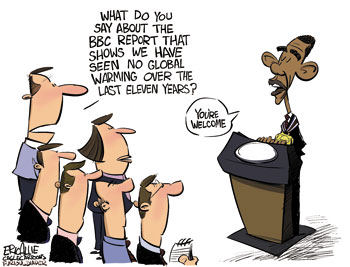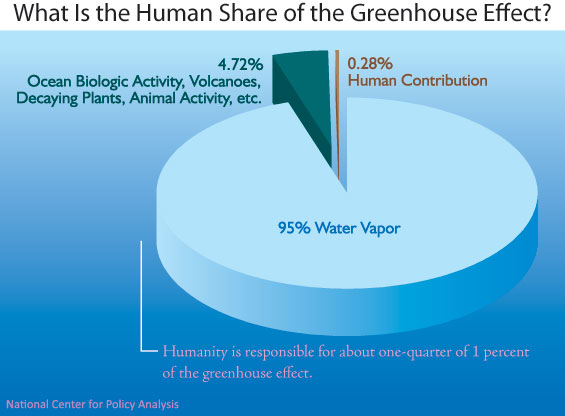
Item: The Obama administration must make a commitment on carbon-emission reductions, insisted the Washington Post on November 19. The House of Representatives, commented the Post, “has endorsed a 17 percent reduction in carbon emissions from the 2005 level, and the Senate is considering a 20 percent cut. The administration is also moving forward with Environmental Protection Agency regulation that does not require congressional approval. Mr. Obama should be able to produce a number or a range of numbers that reflects the level of emissions reduction the United States can achieve.”
Item: An article by Naomi Klein in Rolling Stone dated November 12 makes the case for what amounts to climate reparations by the Western world, particularly the United States, for alleged environmental crimes that are said to have led to global warming. Warming is said to “disproportionately” impact poorer countries.The price tag, she writes, for “shifting to renewable energy, according to a team of United Nations researchers, will raise the cost … to as much as $600 billion a year over the next decade.”
The “climate crisis” has the appearance, says the writer, of “a long and silent war waged by the rich against the poor. And for that, regardless of what happens in Copenhagen, the poor will continue to demand their rightful reparations. ‘This is about the rich world taking responsibility for the damage done,’ says Ilana Solomon, policy analyst for ActionAid USA, one of the groups recently converted to the cause. ‘This money belongs to poor communities affected by climate change. It is their compensation.’”
Item: Global warming, according to a UN official quoted in a November 19 piece by GMA News in the Philippines, is forcing women into prostitution. “The effects of climate change have driven women in communities in coastal areas in poor countries like the Philippines into dangerous work, and sometimes even the flesh trade, a United Nations official said.” “Suneeta Mukherjee … of the United Nations Food Population Fund (UNFPA), said women in the Philippines are the most vulnerable to the effects of climate change in the country. ‘Climate change could reduce income from farming and fishing, possibly driving some women into sex work and thereby increase HIV infection,’ Mukherjee said [during the launch of] … the UNFPA annual State of World Population Report.”
 Correction: Environmentalist extremists, left-wing politicians, United Nations bureaucrats, and hookers do have one driving force in common: what they want to do to their customers (customers sometimes known as taxpayers).
Correction: Environmentalist extremists, left-wing politicians, United Nations bureaucrats, and hookers do have one driving force in common: what they want to do to their customers (customers sometimes known as taxpayers).
Green is their favorite color, especially the long green. Even if one accepts the extremely dubious premise that global warming is the huge problem that it has been made out to be by those in the throes of eco-hysteria, the amounts of money that they would require to be spent for little or no gain are stunning. Now the Third World, through the United Nations, is trying to present developed nations with a tab that would amount to $6 trillion over a decade (about double the entire bloated U.S. budget for 2009). This has been dubbed a “climate justice” bill.
Meanwhile, in the United States, the object is to pass legislation (or, failing that, impose regulations through the Environmental Protection Agency) that would make the cost of energy so expensive that Americans would use less and thereby cut the amount of dreaded greenhouse-gas emissions. We are not supposed to notice that man’s effects on such emissions are dwarfed by Mother Nature. The share of mankind’s contribution to the so-called greenhouse effect is about one-quarter of one percent (0.28 percent), compared to 4.72 percent for ocean biologic activity, volcanoes, decaying plants, etc., and 95 percent from water vapor. (See Dr. Lee C. Gerhard’s study “Geologic Constraints on Global Climate Variability,” Search and Discovery, as cited by the National Center for Policy Analysis.) Those facts have not stopped the lurid projections of impending doom and disaster if man does not slam the brakes on economic progress.
The Copenhagen climate summit was set up to produce an extension of the Kyoto Protocol that expires in 2012. Kyoto was signed but never ratified by the United States, or even submitted to the Senate, because it was so obviously antithetical to American interests. The Senate in fact passed the Byrd-Hagel Resolution in 1997, by a unanimous vote of 95-0, warning the Clinton administration not to enter into any treaty that omitted developing nations or hurt the U.S. economy. The protocol would have done both. (Interestingly, despite the fact that the United States is not a party to Kyoto’s enforcement policies, carbon-dioxide emissions in the United States declined by three percent from 2000 to 2006; the overall emissions of the 27 European signatories were up slightly; the rate in Canada, another signatory, is up 21.3 percent.)
 With huge and growing emitters such as China and India being given an emissions pass, Kyoto has been widely seen as a failure — which also raises the question about the need to effectively extend it with another pact. Yet, even if Kyoto had done everything it supposedly intended, the environmental results would have been negligible, though the economic impact would have been excruciating. According to a study by the U.S. National Center for Atmospheric Research, if every single signatory to Kyoto complied fully, the result would have been a minuscule reduction of the global surface temperature of 0.07o C by 2050, and 0.14o C by 2100.
With huge and growing emitters such as China and India being given an emissions pass, Kyoto has been widely seen as a failure — which also raises the question about the need to effectively extend it with another pact. Yet, even if Kyoto had done everything it supposedly intended, the environmental results would have been negligible, though the economic impact would have been excruciating. According to a study by the U.S. National Center for Atmospheric Research, if every single signatory to Kyoto complied fully, the result would have been a minuscule reduction of the global surface temperature of 0.07o C by 2050, and 0.14o C by 2100.
President Obama said he wanted to “rally the world” at Copenhagen to fight global warming. He assuredly did not tell the American public the price tag for putting on this rigged fight. The bill that narrowly passed the U.S. House of Representatives in June called for a reduction of 17 percent in carbon-dioxide emissions, from a 2005 baseline, by 2020 and 83 percent by 2050. Senior analyst Ben Lieberman of the Heritage Foundation noted that the think tank’s analysis of the bill
found costs that would easily qualify as serious harm to the economy of the United States — including annual reductions in gross domestic product of $393 billion annually, total costs to a household of four of nearly $3,000 annually, and an average of over 1 million net job losses annually. In order to actually reduce emissions, similarly onerous targets would be necessary in any global warming treaty coming out of Copenhagen, and those would certainly violate Byrd-Hagel.
The Senate legislation, the still-pending Boxer-Kerry bill, is even more onerous. It would require slashing emissions in the United States to 1977 levels, as has been noted by Steven Hayward of the American Enterprise Institute. (The nation’s population then was 220 million compared to 305 million now, and the economy, in 2008 dollars, was half the size.) The Senate measure has also been analyzed by former Delaware Governor Pete du Pont, chairman of the board of the National Center for Policy Analysis; it is summarized in part below:
[This 20 percent reduction] would radically change both the U.S. economy and our personal lives. Car and truck miles traveled would have to be reduced by one-third (or fuel efficiency improved by one-third, hard to do in 10 years), which would seriously reduce travel and transportation, and likely force changes in automobile design that consumers would not like. Next, the amount of coal burned to generate electricity would have to be cut in half.
Boxer-Kerry would expand the control the government has over the American economy, businesses and individuals. It would have little impact on reducing global warming, but would significantly depress our economy.
But, wait. Didn’t the President promise that going green was going to boost the economy by creating oodles of jobs that would also be good for the environment? Well, perhaps in Unicornland or some other fantasy world, but not in the real one. A study made earlier this year at the Universidad Rey Juan Carlos in Madrid of a similar Spanish scheme found that the Spanish government had created about 50,000 so-called green jobs; however, as a result, approximately 110,000 other jobs were lost.
Moreover, only about one in 10 of the new positions were permanent jobs. Since 2000, about $774,000 was added to the bills of Spanish consumers to create an average green job. Industries were also chased away to nations with a better economic climate. According to the study: “These costs do not appear to be unique to Spain’s approach but instead are largely inherent in schemes to promote renewable energy sources.” Extrapolating, the report’s authors concluded that even if Barack Obama’s initiatives did result in the production of five million green jobs, about 11 million jobs would likely be lost in other sectors.
As we write, the Copenhagen conference is around the corner. Conventional wisdom holds that for the summit to be deemed successful, there need to be mid- and long-term goals to cut greenhouse gases (which would hurt the struggling U.S. economy), financial support must be forthcoming for the less-developed countries from developed nations (that is, U.S. tax dollars will be dispatched overseas so other nations can compete better with us for clean-energy jobs), and technology transfers must be mandated to poorer countries (no doubt ignoring compensation for the developers of the technologies). We predict the summit’s backers will find the conference a provisional success, and then up the ante.
That will mean more expense for the United States, and not just monetary costs. Deals made through international arm-twisting often directly affect the very sovereignty of nations — and will absolutely undermine national sovereignty in the case of the planned Copenhagen Treaty. Take the “offsets” in environmental schemes that can be bought as a way to compensate for creating emissions. With many multinational agreements, guess who makes the final decisions? The United Nations, that’s who — with its scores of anti-American countries more than willing to extort “reparations” from the developed world, especially from the United States. As policy analyst Ben Lieberman has pointed out:
Currently, the Clean Development Mechanism under the U.N. decides which offset projects are acceptable. Thus, unelected international bureaucracies would control this critical aspect of a climate treaty, which would have significant implications for the U.S. economy.
The largest sovereignty threat is that a subsequent treaty may create an international enforcement authority to determine whether signatories — including the U.S. — are in compliance with the treaty provisions and to deal with perceived violations. For example, a non-U.S.-controlled body could decide whether American companies must shut down coal-fired power plants.
The chances that the emerging global green regime would be concerned about our enervated energy sector are between slim and none. And Slim is skipping town — with your job, leaving you only with a gargantuan unpaid bill.




